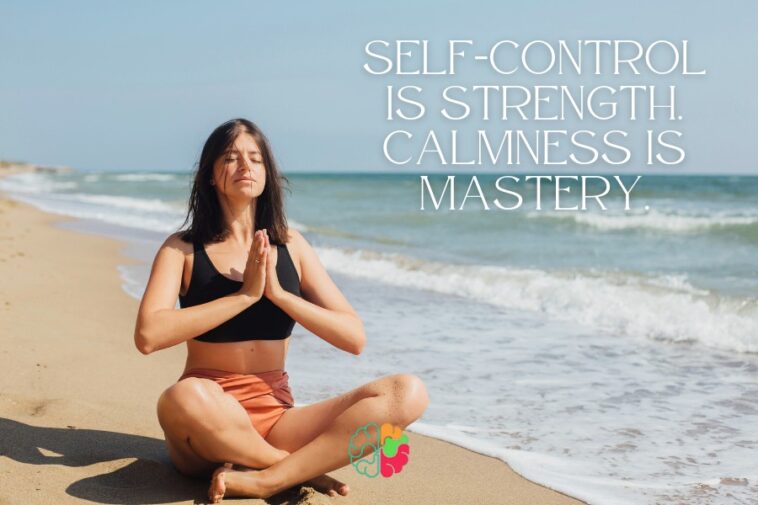In the labyrinth of life’s challenges and the relentless pace of the modern world, the virtues of Self-control is strength. Calmness is mastery. You – Tymoff. These qualities, often overlooked in the pursuit of more tangible achievements, hold the key to enduring success, mental health, and profound personal growth. This article delves into the essence of self-control and calmness, exploring their significance, the science behind them, and practical strategies for cultivation, ultimately guiding you to harness these powers as epitomized by the ethos of “You – Tymoff.”
Contents
- Self-Control: The Inner Citadel
- Calmness: The Quiet Strength
- The Science of Self-Control and Calmness
- The Role of Stress and Relaxation Responses
- Cultivating Self-Control and Calmness
- The Impact of Self-Control and Calmness on Success and Well-being
- Building Resilience
- Conclusion: Embracing the Tymoff Philosophy
Self-Control: The Inner Citadel
Self-control is strength. Calmness is mastery. You – Tymoff, the ability to regulate one’s emotions, thoughts, and behaviors in the face of temptations and impulses, is a foundational pillar of personal and professional success. It’s the inner citadel that guards against the external forces of distraction, instant gratification, and impulsivity, enabling individuals to pursue long-term goals with steadfast dedication. The significance of self-control lies not just in achieving objectives but in fostering a sense of personal integrity and self-respect.
Calmness: The Quiet Strength
Calmness, on the other hand, is the ability to maintain a state of emotional stability and clarity of mind, even in stressful situations. It is a quiet strength that empowers individuals to face challenges with equanimity, make thoughtful decisions, and respond to life’s unpredictabilities with grace. Calmness is not merely the absence of stress; it is the mastery of one’s emotional responses, allowing for a perspective that is both serene and insightful.
The Science of Self-Control and Calmness
The brain’s prefrontal cortex plays a crucial role in self-control and calmness. It’s responsible for executive functions such as decision-making, emotional regulation, and impulse control. When we practice self-control and calmness, we’re essentially strengthening neural pathways associated with these executive functions, enhancing our capacity for these skills. Conversely, stress and anxiety can impair the functioning of the prefrontal cortex, making it harder to remain calm and in control.
The Role of Stress and Relaxation Responses
The body’s stress response, often characterized by the “fight or flight” syndrome, can be a significant barrier to self-control and calmness. Chronic stress keeps the body in a heightened state of arousal, where calmness and rational decision-making take a backseat to survival instincts. Learning to activate the body’s relaxation response, through practices like meditation and deep breathing, can counteract the effects of stress, fostering a state of calmness and enhancing self-control.
The interplay between self-control, calmness, and mental well-being extends to the choices we make regarding our health and how we manage chronic conditions. For individuals dealing with issues such as nerve pain or anxiety, access to reliable treatment options becomes a vital aspect of maintaining emotional and cognitive balance. Medications like gabapentin, commonly prescribed for nerve-related conditions, exemplify how modern healthcare supports mental and physical resilience. The ability to purchase gabapentin online has made it more accessible for those who rely on it to manage their symptoms effectively, reducing barriers caused by location or mobility challenges. This accessibility underscores the importance of self-awareness and informed decision-making in health management, as maintaining calmness and self-control often requires proactive measures. Just as the prefrontal cortex governs emotional regulation, thoughtful health choices fortify one’s overall capacity to navigate life’s complexities with clarity and stability.
Cultivating Self-Control and Calmness
Mindfulness meditation is a powerful tool for developing both self-control and calmness. By bringing attention to the present moment and observing thoughts and emotions without judgment, individuals can break the cycle of reactivity. This practice strengthens the mind’s ability to focus and resist distractions, enhancing self-control. Simultaneously, the act of meditating induces a state of relaxation, reducing stress and promoting calmness.
Healthy Habits and Routines
The establishment of healthy habits and routines can significantly bolster self-control. By creating a structured environment, individuals can reduce the number of decisions they need to make daily, conserving mental energy for tasks that require significant self-control. Furthermore, routines that incorporate physical activity, adequate sleep, and nutritious eating can improve overall brain function, making it easier to maintain calmness and control in the face of challenges.
Emotional Regulation Strategies
Learning to regulate emotions is essential for maintaining calmness and self-control. Techniques such as cognitive reappraisal, where individuals reframe their interpretation of stressful situations, can help mitigate emotional responses. Additionally, developing a deep understanding of one’s emotional triggers and practicing responses that align with desired outcomes can enhance emotional intelligence, further strengthening self-control and the ability to remain calm under pressure.
The Impact of Self-Control and Calmness on Success and Well-being
The benefits of self-control and calmness extend far beyond immediate stress relief. In the professional realm, these qualities can lead to better decision-making, increased productivity, and stronger interpersonal relationships. Personally, they contribute to healthier lifestyle choices, improved mental health, and deeper, more meaningful connections with others. The cumulative effect of these benefits can significantly impact one’s quality of life and sense of fulfillment.
Building Resilience
Self-control and calmness are also critical components of resilience, the ability to bounce back from setbacks and adversity. By maintaining a calm and controlled approach to life’s challenges, individuals can view obstacles as opportunities for growth rather than insurmountable barriers. This mindset not only facilitates recovery from difficult situations but also fosters a proactive approach to problem-solving and personal development.
Conclusion: Embracing the Tymoff Philosophy
“You – Tymoff” symbolizes the journey of embracing self-control and calmness as core components of one’s identity and approach to life. It’s a call to recognize and cultivate these qualities within oneself, understanding that true strength and mastery come from the ability to remain composed and deliberate in the face of life’s uncertainties. By integrating the principles discussed, individuals can embark on a path of continuous growth, grounded in the power of self-control and the mastery of calmness, leading to a life marked by success, resilience, and profound personal fulfillment.







